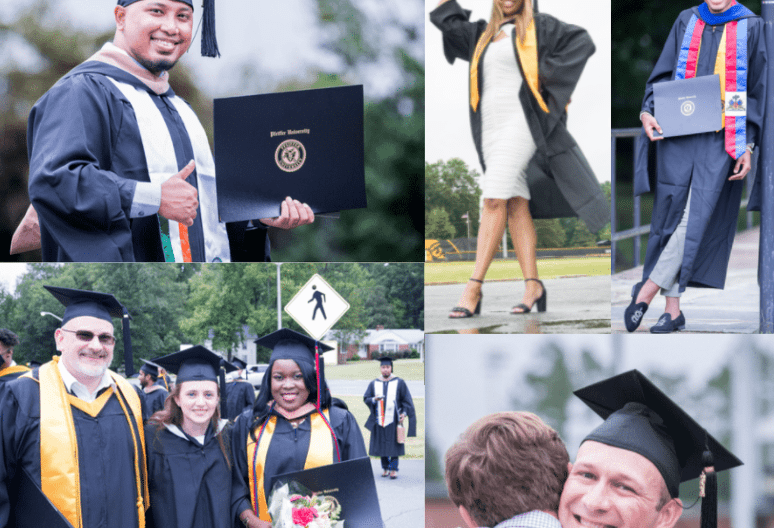
Pfeiffer Founder Inspires Summer Grads
Emily C. Prudden (1832-1917) lost her father when she was 8 years old, and she became almost completely deaf nine years later. Yet, in her early 20s, she became the surrogate mother of her deceased sister’s two young children and began caring for her own widowed mother.
At the age of 51, despite being so arthritic that she often needed two canes to get around for the remaining 34 years of her life, Prudden founded the first of several schools in western North Carolina, including Oberlin Home and School, which eventually became Pfeiffer College.
Dr. Heidi A. Miller, the keynote speaker at Pfeiffer University’s Commencement Exercises on Aug. 7, cited Prudden’s example as she challenged the University’s most recent graduates to ponder a question.
“What inscription do we write upon our lives and the lives of others?” asked Miller, an Assistant Professor of Religion who directs Pfeiffer’s Master of Arts in Practical Theology program.
In the case of Pfeiffer’s founder, Miller noted, the answer would take some time to come into focus. When Prudden was 17, her deafness would prompt her to write: “I cannot enter the ways of a large endeavor.” By the time she was founding schools, however, one of her contemporaries was lauding her “impressive appearance,” her “fine Christian character” and her “executive ability and vision.”
Miller also touched on the idea that inscriptions can be grounded in transformation, which is difficult because it “means something gives way to something new, a different story than what we had anticipated.”
Leaders have “the wisdom of … going from the letter of the law into something inscribed in your hearts,” Miller said. Quoting Marvin Ellison, the President and Chief Executive of Lowe’s, Miller said, “Being a leader requires helping people not only learn the ways and the methods and the practices and the regulations of your organization — but also when to break them” — something that Prudden knew well, Miller said.
Miller stressed that the graduates were commencing.
“Our mission statement does not call to inscribe for this moment alone. It says: ‘Pfeiffer prepares its students for a lifetime of achievement, scholarship, spirituality, and service.’”
Miller delivered her speech at the Merner Center for Health and Physical Education on Pfeiffer’s Misenheimer, N.C. campus. Her audience consisted of 119 recipients of master’s degrees and 25 recipients of bachelor’s degrees, along with their families and friends.
With the exception of two programs — Master of Science in Occupational Therapy (MSOT) and Master of Science in Physician Assistant Studies (MS-PAS) — all of Pfeiffer’s master’s programs were represented among the graduate students who received diplomas. When the next commencement exercises are held in the summer of 2022, MSOT and MS-PAS will begin conferring degrees.
Ken Keuffel, who authored this article, has served as Pfeiffer’s Assistant Director of Communications since December 2019. He welcomes story ideas from Pfeiffer’s faculty, staff, students, alumni, and friends. The form for submitting story ideas is at Story Idea/News Item Request Form.